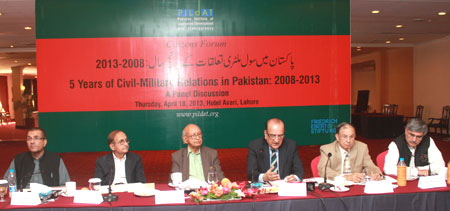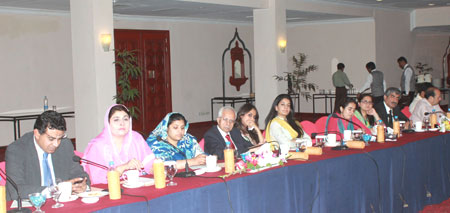| |
April 18, Institutional forums of decision making on defence and national security should be strengthened to achieve a balance in civil-military relations, believed participants of a PILDAT Forum on 5Years of Civil Military Relations in Pakistan: 2008-2013. |
|
| |
Senator S. M. Zafar, Former Federal Minister, chaired the Citizens Forum while other speakers at the Forum included Mr. Shahid Hamid, senior Advocate Supreme Court; former Defence Minister, Dr. Hasan Askari Rizvi, Defence and Political analyst, Mr. Mujib-ur-Rehman Shami, Editor in Chief Daily Pakistan, Lt. Gen. (Retd.) Humayun Bangash, Former Ambassador and Mr. Ahmed Bilal Mehboob, President PILDAT.
|
|
| |
Senator S. M. Zafar said that the Constitution of Pakistan clearly defines the role of Armed Forces of Pakistan but the reality is that Army took over the reins of power four times. Military�s role increases when there is an internal or external security threat perception. Another reason for military interference is weakness of the political system including bad governance. There is no democracy in most political parties and their weaknesses have allowed the military to intervene. He said that most of the elections in the history were manipulated and rigged. He also said the Parliament has been ineffective in its oversight role on defence. Looking ahead, he said, people will choose who governs them through upcoming Election and they must exercise this power responsibly. |
|
| |
Dr. Hasan Askari Rizvi believed that in current scenario no single organization can run the Government. Army ran the system alone in the past but it is not possible to do so anymore. for However, this does not mean that Army�s role in power has diminished; instead it is influencing the decision-making from the sidelines and will continue to do so for a while using channels such as political or religious parties as well as media.. He believed that the traditional model of Civil Military relations in Pakistan is no more workable. The relationship today is more flexible and with a room for bargaining on both sides. Military needs the support of political leadership in war or terror. He believed that a credible civilian alternative should be created for a balanced and constitutional equation of civil-military relations in Pakistan. |
|
| |
Mr. Shahid Hamid said that some progress has been recorded in the past 5 years in this realm. However, he believed, activation and effective utilisation of existing forums is needed to establish effective democratic control of defence. Effective utilisation of higher defence organisation, including its 3 tiers of Joint Chiefs of Staff Committee, Defence Council and Defence Committee of the Cabinet is essential in this regard. He added that an empowered Defence Minister is the first step towards an effective Defence Ministry that can establish democratic control on defence in Pakistan. |
|
| |
Mr. Mujib-ur-Rehman Shami blamed Pakistan�s nascent political culture and processes, as well as those at the helm of affairs since independence for the imbalance in Pakistan�s civil-military relations. He believed that politicians and political governments did not quite receive a fair chance of governance. He also stressed that weakness of the governance does not mean the weakness or failure of democracy. He was of the view that the upcoming Government needs to provide improvement in governance as well as on establishing democratic supremacy in defence affairs. |
|
| |
Lt. Gen. (Retd.) Humayun Bangash was of the view that in most of the countries where military has ruled has been due to corruption and ineptness of the politicians. When improvement in governance is achieved under the military rule, the military goes back to barracks. Essentially, he repeated the general military notion that military intervenes to respond to a political vacuum in governance and decision-making. He also questioned the talk of the trial of Gen. Musharraf. |
|
| |
Earlier Mr. Ahmad Bilal Mehboob, while welcoming the participants, gave a brief presentation on the past 5 years of Civil Military relations in Pakistan. He said that in the past 5 years, some improvement has been seen in an endeavour to balance civil-military relations. For the first time in the history of the country, an elected civilian Government completed its term without direct military intervention. Parliament has received greater details of the defence budget and Parliamentary committees, especially those of defence and national security, have begun to exercise some oversight on defence. The previous 5 years have also seen many stresses in civil-military relations especially those in the case of the Memo controversy. A lot needs to be accomplished by the incoming Government which must strengthen forums of decision-making on defence and strategic issues. |
|
| |
PILDAT launched a Monitor on Civil-Military Relations at the Forum also. The monitor can be accessed here: http://pildat.org/eventsdel.asp?detid=618
PILDAT received support from the Friedrich Ebert Stiftung Pakistan for publishing the Monitor as well as holding a Forum. |
|
| |
|
|
| |

|
|
| |
|
|
| |

|
|
| |
|
|
| |

|
|